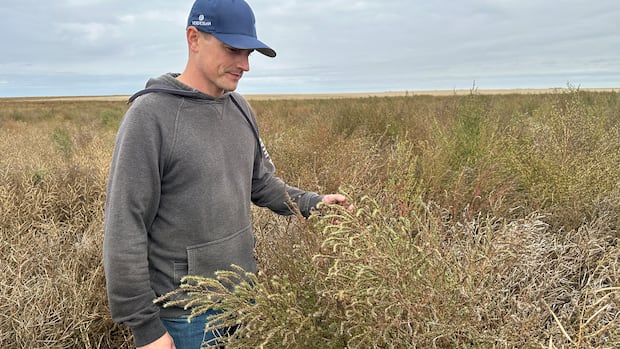Premier Danielle Smith wasn’t doing anything politically revolutionary when she demanded the repeal of Ottawa’s environmental assessments act during the federal election campaign. Then she demanded it again, many times, when the Conservatives who promised to do so lost and the Mark Carney Liberals won.
It was a longstanding, years-old cry from Alberta leaders, ever since the moment that the Trudeau-era Bill C-69 — what former premier Jason Kenney dubbed the “no more pipelines act” — was first passed in 2019 (and became repealable).
Then, a few weeks ago, Smith’s tune began to change about the legislation that has been strongly contested by energy companies.
Her rhetoric softened from urging the guillotine to a blade with more precision on the law now known as the Impact Assessment Act (IAA).
Some revisions
Since June, she’s thrown in alternative recommendations.
They include: “overhauling” in a June 17 comment; “substantially revised” in a July 2 reply to a reporter; and “repealing or amending” in a July 7 joint press conference with Ontario’s premier — and the same dual-option language at Tuesday’s announcement at the premier’s summit.
Smith put some rationale behind her refined stance in a mid-June interview on Rosemary Barton Live, when she expressed support for Carney’s major bill to expedite project approvals, but reiterated her hopes he’d still address the IAA.
“Let’s be practical: the federal government has jurisdiction for linear projects that go cross-border … whether it’s pipeline or whether it’s transmission lines but … there’s measures that they’ve put into the bill that are not technical, that are ideological and that don’t really have any measurables around them and create confusion,” Smith said.
“So that’s part of the reason why C-69 needs to be substantially revised.”
But Smith didn’t explain her shift in tone that day, or otherwise.
It was a quiet pivot after years of a provincial fight for the outright demise of legislation that became so notorious that protestors made Quentin Tarantino-style posters demanding “Kill Bill C-69.”
When asked about the moderated message, the premier’s office wouldn’t say there’s been a change from her past language.
But the revised tone that observers have noticed could be Alberta’s premier offering a spirit of greater compromise, in line with Carney’s own different direction than his Liberal predecessor Justin Trudeau.
It could also be a reflection that the oil and gas companies don’t actually want the Impact Assessment Act swept off the books.
When the coalition of energy CEOs issued a “Build Canada now” open letter during the election campaign, it instead called on the IAA to be “overhauled and simplified.”
As much as the oil sector dislikes the federal law, businesses’ opposition to full repeal boils down to this: scrapping the IAA means there’s no environmental assessment law, and Parliament must start all over again.
And if there’s one thing the oil industry dislikes, it’s uncertainty, said Heather Exner-Pirot, a senior fellow of the Macdonald-Laurier Institute think-tank.
“From the industry’s perspective, that could much more likely be a nightmare than be a smooth path toward clarity on regulation,” she said.
“Everyone hates the idea of just going back and forth with a whole new federal environment assessment process after every election or after every government.”
Industry would prefer amendments that keep the basic system in place but alter the “project list” to remove from federal scrutiny proposed mines and resource developments wholly situated within provincial jurisdiction, said Exner-Pirot, who is also a special adviser to the Business Council of Canada.

She believes the Smith government’s harder stance was “for obviously political reasons,” but that may also account for recently easing it. “I think they believe [Energy Minister Tim] Hodgson and Carney and they’re giving them some extra leash.”
While the Carney government’s new Building Canada Act would let the federal government bypass some review processes for projects deemed to be “nation-building,” that has not eased the pressure it’s faced to further neutralize the IAA.
The Liberal government already did so last year, amending the bill to bring it into compliance with a Supreme Court ruling that found the bill unconstitutional — a court victory for Alberta after the province challenged the bill.
Smith laid out several demands for further amendments to the IAA in a letter last October to Trudeau, and a month later Alberta brought another court challenge to strike down the updated law.
In an email to CBC News, Smith spokesman Sam Blackett referred to the premier’s letter last fall and said she “has consistently called for the repeal or significant overhaul of [the] federal Liberal government’s bad laws,” including C-69.
The IAA aside, Alberta’s premier has continued to demand straight repeal of other federal laws or policies, including the West Coast tanker ban and the carbon emissions cap on the oil and gas sector.
Smith has said she’s hoping for such changes when Parliament returns this fall from summer recess, and that it could help cool Albertans’ lingering frustrations with Ottawa, as well as separatist sentiment.
A brighter assessment
The Carney government has not indicated it’s about to significantly weaken existing climate and energy policies.
Asked about potential IAA reforms, a federal spokesperson said the recently passed Bill C-5 will expedite “projects of national significance,” and that Ottawa wants to strike deals to recognize provincial or Indigenous-led assessments as substitutes for federal ones.
“Canadians know that we don’t have to choose between rigorous impact assessments and building projects in our national interest — we can do both,” said Keean Nembhard, press secretary to Environment Minister Julie Dabrusin, in an email.
Were there to be additional revisions to the federal assessment act, that could provoke further pushback from the environmental and Indigenous groups the IAA was initially designed to cater to, with its enhancements to the review and consulting processes.
There could be some concessions to Alberta, said Martin Olszynski, a University of Calgary law professor who was co-counsel for WWF Canada as intervenor in Alberta’s IAA court challenge. And that might help explain Smith’s call for amendments instead of repeal.
“Symbolic pandering to your base apparently has limits when there are potentially concrete policy gains on the table,” Olszynski told CBC News.
Discarding the IAA remained part of federal Conservative Leader Pierre Poilievre’s election platform this spring, and it’s still in his rhetorical repertoire. Earlier this month, he told CBC Radio’s The House he wants “the full repeal of C-69, the anti-pipeline and anti-energy law.”

Former oilsands executive Richard Masson deems the current law largely a failure at helping build anything. According to a recent analysis by the law firm Torys, no major project has been approved yet though the IAA process other than the Cedar LNG project, whose review was mostly done through British Columbia’s provincial assessment process, substituting for the work of the Impact Assessment Agency of Canada.
A spokesperson for the federal agency told CBC News that the 2024 amendments have narrowed the scope of the act, and that the agency has been “doing things differently to ensure all projects can be assessed in two years moving forward” — in line with a Liberal campaign promise.
Despite his criticism, Masson agrees that scrapping the IAA runs counter to industry wishes to ensure predictability and avoid disruption. He credits Smith for finding a more nuanced position than before.
“It’s an example of figuring out what’s possible, what has a chance of success,” says Masson, an executive fellow at the University of Calgary School of Public Policy. “Otherwise we’re just going to disappoint a lot of people pushing for something that can’t be achieved.”
It’s not, however, clear that substantial revision is in the cards either, for the bill that’s long been disdained by Alberta political and business leaders alike. But now, at least, the oil executives and the pro-oil premier who champions them are singing the same tune.







